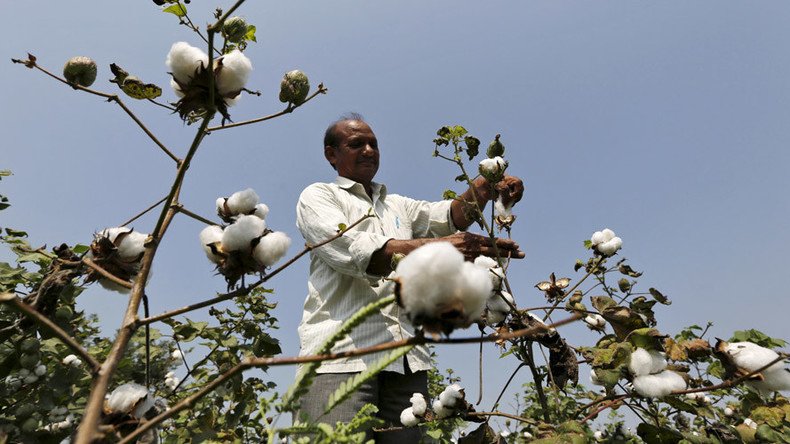‘Monsanto shouldn’t be allowed to exploit farmers’: India vows to break up GM-cotton monopoly

India has vowed to protect farmers from exploitation and continue regulating the price of genetically modified cotton seeds in the country, looking to break down the monopoly of Monsanto – a US based agrochemical giant which controls 90 percent of the Indian market.
Monsanto is being pushed by the government of Prime Minister Narendra Modi to accept the dictated government price, as India expects to develop its own genetically modified (GM) cotton varieties early next year.
In a move to break away from a dependency on American technological know-how in the genetic seed market, India has cut royalties paid by local firms for Monsanto’s seeds by more than 70 percent. The government also capped GM cotton seed prices at 800 rupees ($11.90) for a packet of 400 grams, starting in April 2017.
‘Take it or leave it’: #India urges Monsanto to accept GM-cotton royalty cuts https://t.co/woVGKucEDrpic.twitter.com/Lgh9KzjCAE
— RT (@RT_com) March 17, 2016
Threatening to leave the Indian market after six decades and cut access to US technology, Monsanto has in response taken the issue to court. The giant has called the government-driven intervention to regulate the the market “arbitrary and potentially destructive”.
Speaking at a two-day conference in Delhi about kharif sowing season, Agriculture minister Radha Mohan Singh once again reaffirmed the government’s commitment to challenge Monsanto.
“It [Monsanto] is a good company. We respect them, but that does not mean you loot farmers and charge whatever price, because you have knowledge,” Singh said as he tasked government officials to keep a careful watch on seed prices and monitor monopolistic activity. “Be it seed or pharma, we will continue to regulate prices, whenever required,” he said.
Mahyco Monsanto Biotech (MMB), a joint venture with India’s Mahyco, licenses its products to a number of local seed companies in exchange for royalties. The company also sells seeds directly though the local licensees. In India Monsanto has patent rights on second generation Bollgard II technology designed to protect seeds from damaging worm species. However the company does not have a patent for an earlier version Bollgard I.
Claiming that “monopoly should not be allowed” the minister stressed that technological evolution should be used to benefit the farmers.
“Companies like Monsanto should not be allowed to exploit farmers just because they have technology. Be it seed or pharmaceutical company we should see to it that there is no monopoly. We will keep regulating prices of seeds and medicine,” the minister said.
India’s Competition Commission (CCI) in the meantime continues to probe alleged anti-competitive practices in the GM cotton seed market. The investigation follows two separate complaints filed against the St. Louis-based company.













